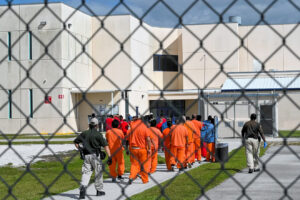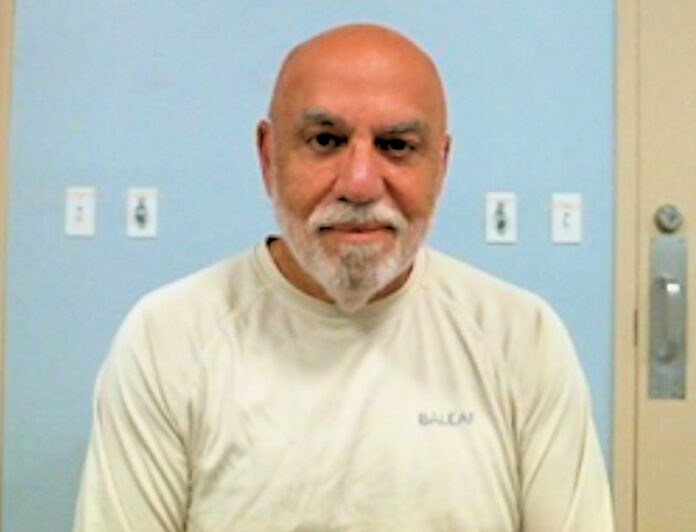(Français)
For decades, Pierre Reginald Boulos, 69, one of Haiti’s richest and most powerful businessmen, has been a key interlocutor and darling of the U.S. State Department (DoS), referred to as “Reggie” by many in the foreign service, as evidenced in the secret diplomatic cables obtained by Wikileaks and published by Haïti Liberté in 2011.
But on Jul. 17, 2025, Immigration and Custom Enforcement (ICE) agents descended on his $1.4 million mansion in Boca Raton, FL and arrested Boulos “for violating the Immigration and Nationality Act [and] contributing to the destabilization of Haiti,” according to a Jul. 21, 2025 ICE press release.
He was taken to Miami’s Krome North Service Processing Center and will go before immigration judge Jorge Pereira at 8 a.m. on Jul. 31 at the Krome Detention Center. Boulos was moved on Jul. 19 “to a federal detention center in Homestead,” according to the Miami Herald. He faces deportation back to Haiti, which he fled shortly before President Jovenel Moïse’s Jul. 7, 2021 assassination, a crime for which he is widely suspected to be an intellectual author and financier.
Not since the 2012 arrest of Clifford Brandt, another prominent Haitian bourgeois icon, for kidnapping two members of a rival elite family have the Haitian people been so mesmerized by a ruling-class drama.
In May, the State Department classified Haiti’s Viv Ansanm(Let’s Live Together) political party, formed from a coalition of armed neighborhood groups around greater Port-au-Prince, as a “foreign terrorist organization” (FTO), threatening sanctions for any Haitians providing them material aid. At the same time, the DoS also warned that “U.S. lawful permanent residents and U.S. citizens… could face criminal charges and inadmissibility or removal from the United States” if they were deemed to be “providing material support or resources to Viv Ansanm.”

Boulos appears to be the first victim of this new U.S. policy. Indeed, on Jul. 21, Secretary of State Marco Rubio issued a statement saying that the DoS “has determined that certain individuals with U.S. lawful permanent resident status have supported and collaborated with Haitian gang leaders connected to Viv Ansanm,” without expressly naming the oligarch.
Ironically, Boulos was born in New York and has spent most of his life as a U.S. citizen. He only renounced his U.S. citizenship about a decade ago when he launched his own political party in Haiti, the MTVAyiti. (The acronym originally stood for the Movement for a Third Way but was changed to Movement for the Transformation and Valorization of Haiti). In fact, the Trump Administration is arguing that Boulos lied on his application for permanent residency in the U.S. by omitting his political ambitions in Haiti. He received his “green card’ last year, according to the New York Times.
Boulos has always been a major player in Haiti’s political turmoil over the past four decades. He and his family contributed to and supported the two coups d’états against President Jean-Bertrand Aristide in 1991 and 2004. The Wikileaks cables say that Boulos was a leader in the bourgeoisie’s “creating private armies” in 2005 by giving guns and ammunition to cops to fight “gangs” in Haiti’s slums which were anti-coup and anti-occupation.
He also encouraged MINUSTAH to attack Cité Soleil despite the U.S. Ambassador’s warnings that it would “inevitably cause unintended civilian casualties given the crowded conditions and flimsy construction of tightly packed housing.”
Other cables show how Boulos engineered and funded the opposition in 2005 to René Préval’s second presidential bid, how he then flipped to urge challenger Leslie Manigat to concede to Préval after the very close Feb. 7, 2006 election, and how he was pursued in 2007 by chief prosecutor Claudy Gassant for ”smuggling, corruption, and extortion of public Customs officials.”
Boulos was also a big supporter of the UN Mission to Stabilize Haiti (MINUSTAH), which militarily occupied the country from 2004 to 2017. He pushed the force to carry out terrible massacres in Haiti’s slums. “We are waiting for [MINUSTAH Chief Juan Valdés] to give clear instructions to the troops under his command to cleanse Cité Soleil of the criminals, like they did in Bel Air,” Boulos told Radio Métropole listeners on Jan. 5, 2006. “You cannot make an omelet without breaking eggs. We think that MINUSTAH’s generals need to make plans to limit collateral damage. But we in the private sector are ready to create a social assistance fund to help all those who would be innocent victims of a necessary and courageous action that should be carried out in Cité Soleil.”
Meanwhile, Jimmy “Barbecue” Cherizier, the Viv Ansanm’s president and spokesman, denied in a Jul. 20 video that Boulos had ever provided material support to Viv Ansanm, which was founded in September 2023 as an armed “people’s movement”against U.S. puppet Prime Minister Ariel Henry, whom the Viv Ansanm succeeded in overthrowing in February 2024.
Cherizier did say that Boulos, using a proxy gun-dealer named Frantzy “Didi” Valmé, sold guns and gave money to himself and other armed neighborhood group leaders in 2019, 2020, and 2021. Boulos also funded Cité Soleil leader Jean Pierre Gabriel to launch the G-Pèp coalition one day after Cherizier launched his G9 coalition in May 2020. There ensued four years of bloody inter-neighborhood battles, to which the Viv Ansanm truce finally put an end.
“It was Didi and Reginald Boulos who used to bring money [and guns] to all the popular quarters,” Cherizier said.
As the owner of Universal Motors and Autoplaza, Haiti’s Nissan dealership, Boulos asked Cherizier to burn down the rival Toyota dealership across the street from Barbecue’s Delmas 6 neighborhood. Cherizier refused, and a bitter, public rift emerged between the two, signaling the growing independence of armed neighborhood groups from their former bourgeois patrons.
In addition to his car dealerships, Boulos has owned the Delimart supermarket chain, Le Nouveau Matin newspaper, and la Societe Immobiliere et Financiere d’Haiti (SIF).

One of the greatest controversies swirling around Boulos is about his widely suspected role in Jovenel Moïse’s assassination. While he has denied any involvement, the feud between the two former allies was acrimonious, and Boulos had the connections and money to, at least in part, organize 28 foreign mercenaries to deploy in Haiti and carry out the murder.
“The United States will not allow individuals to enjoy the benefits of legal status in our country while they are facilitating the actions of violent organizations or supporting criminal terrorist organizations,” said Rubio in his Jul. 21 statement.
The biggest question in Boulos’ arrest remains the motive of the Trump administration.
“This case was investigated jointly with the U.S. Department of State’s Diplomatic Security Service and the U.S. Citizenship and Immigration Service’s Fraud Detection and National Security Directorate,” states ICE’s Jul. 21 press release. “The Department of State determined that Boulos’ presence or activities in the United States would have potential serious adverse foreign policy consequences for the United States, providing a basis for the charge of removability. Specifically, officials determined that he engaged in a campaign of violence and gang support that contributed to Haiti’s destabilization. Additionally, in his application to become a lawful permanent resident, he failed to disclose his involvement in the formation of a political party in Haiti, Mouvement pour la Transformation et la Valorisation d’Haiti, and that he was referred for prosecution by the Haitian government’s Unit for the Fight Against Corruption [ULCC] for misusing loans, supporting an additional ground of removability based on this fraud. He is currently in ICE Enforcement and Removal Operations detention.”
Is Boulos, Washington’s long-time ally in Haiti, a sacrificial lamb who has outlived his usefulness? Is his arrest an attempt to blunt and deflect charges that the U.S. is only targeting Haiti’s poor and not the wealthy bourgeoisie which helped spawn Haiti’s “gangs,” now increasingly independent and calling for “system change” and revolution? By going after and making an example of a big fish like Boulos, is Washington trying to scare Haitians, both in Haiti and its diaspora, from providing any kind of support to Viv Ansanm?
These questions may get an answer if Washington really does deport Boulos back to Haiti in the days ahead.











[…] What Lies Behind ICE’s Arrest of Haitian Oligarch Reginald Boulos? Haiti Liberte […]
[…] l’Organisation des États américains (OEA) pour qu’elle déploie une force d’intervention et l’arrestation de l’oligarque haïtien Reginald […]